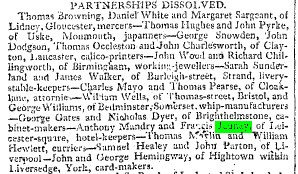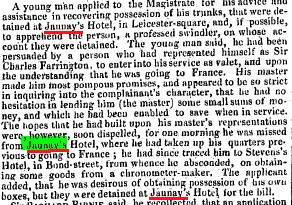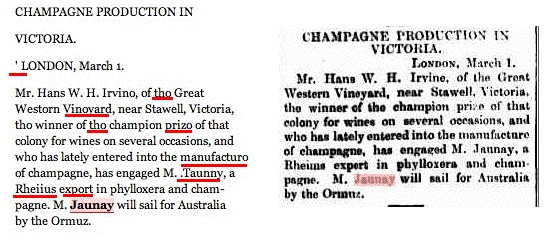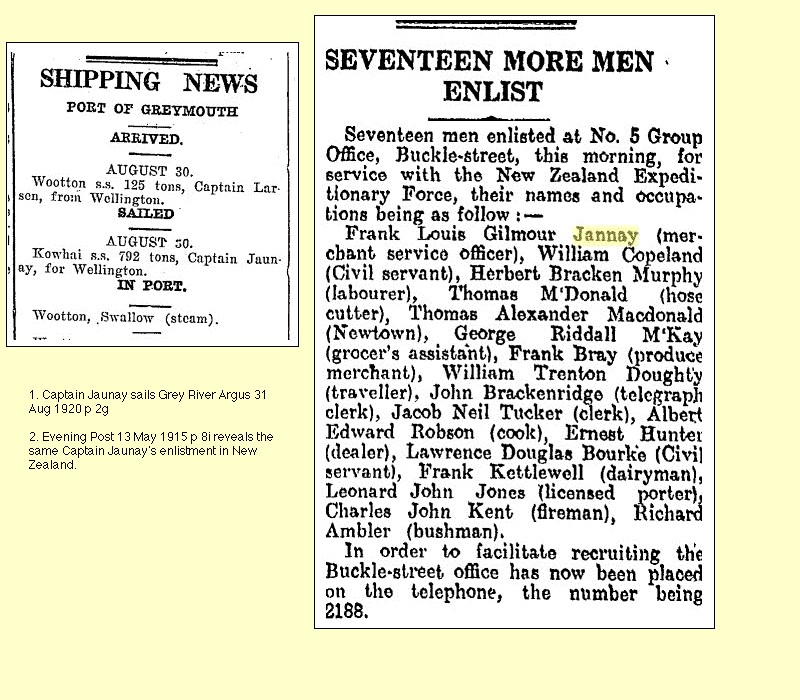You
are receiving this because your address is subscribed at: www.jaunay.com/newsletter.html

February 2009
February seminars
8: Coming to grips with FamilySearch, WEA Centre Adelaide 10:00am
March seminars
1: Finding SA families in newspapers West Torrens Libray 1:30pm
15: Researching the maternal line. Tea Tree Gully Library 2:00pm
27: Researching your English ancestors WEA Centre 6:30pm
See the seminar program for more details.
Shake your family tree
A free event at the National Archives of Australia across their Australian offices on 25 Feb from 10:00 to 4:00pm.
More UK records online
More than 600,000 records of births, baptisms, marriages and burials have been added to a searchable online service at The Genealogist web site. These records were previously only viewable on microfilm as the RG 8 series at The National Archives (Kew).
Among the extensive collections you can find:
1. Maternity records from the British Lying-in Hospital in Holborn, 1749–1868.
2. Registers of burials in the Victoria Park Cemetery, Bunhill Fields Burial Ground, Bethnal Green Protestant Dissenters Burying Ground and others.
3. The archive of the Russian Orthodox Church in London 1721–1927. These records include births, marriages, deaths and conversions, as well as comprehensive general records on the day-to-day running of the church
Also at the same site the former RG 7 series, the marriage and baptism records from the Fleet Prison, covering the period 1667-1777 are also now fully searchable online at the same site. These include the marriage records of some 800,000 people, the majority of whom were from London and the surrounding counties, with a further 2,400 baptismal records.
Adelaide Proformat supports and uses The Genealogist for UK online records simply because it contains quality data checked by experts. By subscribing to The Genealogist via these links you can show your support for Adelaide Proformat and this newsletter.
In
this issue:
News
February seminars
March Seminars
Shake you family tree
More UK records online
Feature article
Accessing newspapers on the Web
News
February seminars
March Seminars
Shake you family tree
More UK records online
Feature article
Accessing newspapers on the Web
![]()
Adelaide
Proformat
5 Windana Mews
Glandore SA 5037
Australia
Tel: +61 8 8371 4465
Fax: +61 8 8374 4479
proformat@jaunay.com
Services
• Research
• Drafting charts
• Locating documents
• Seminar presentations
• Writing & publishing
• SA lookup service
• Ship paintings
Adelaide Proformat uses
The
Genealogist - for UK census, BMD indexes and more online simply
because it contains quality data checked by experts.
Proformat News acknowledges the support by ![]() AWE
AWE
Since last writing on the topic of newspapers there have been a number of developments which have made many more newspapers directly available to family historians. This article will start with those newspapers now on line and freely accessible and searchable by residents in South Australia.
Since the first half of 2007, South Australians have been able to freely access the scanned and indexed images of a range of British newspapers including the London Times. To gain free access, it is just a matter of calling into the front counter at the State Library of SA and asking for Resource Card that one needs within the library to order items not available on the public shelves. Holders of this card can now use the new feature available to SA residents on the State Library web site called Home access that currently allows access to a range of databases. In the context of this article, apart from the Times, there are a further 47 19th century newspapers offered by the Gale Group and that amounts to over 2 million scanned pages from the: Aberdeen Journal, Baner Cymru, Belfast Newsletter, Birmingham Daily Post, Brighton Patriot, Bristol Mercury, Caledonian Mercury, Champion, Charter Chartist, Chartist Circular, Cobbetts Weekly Political, Daily News, Derby Mercury, Examiner, Freemans Journal, Genedi, Glasgow Herald, Goleuad, Graphic, Hampshire/Portsmouth Telegraph, Hull Packet, Illustrated Police News, Ipswich Journal, Jacksons Oxford Journal, Leeds Mercury, Liverpool Mercury, Lloyds Illustrated Newspaper, London Dispatch, Manchester Times, Morning Chronicle, Newcastle Courant, North Wales Chronicle, Northern Echo, Northern Star, Old Fellow, Operative, Pall Mall Gazette, Penny Illustrated Paper, Poor Mans Guardian, Preston Chronicle, Reynolds Newspaper, Southern Star, The Era, Trewmans Exeter Flying Post, and the Western Mail.
When first obtaining the Resource Card, the new user is given a set of access notes which are easy to follow and so access issues will not be discussed but rather the content. The features of the site allow the user to view full runs when possible of C19th national and regional newspapers with text searchable features and the choice to view entire pages or individual articles, save, bookmark, and e-mail or print results. At times the image can be difficult to read but this is easily overcome with the option to enlarge the image up to 400%.

1. François Marie Jaunay dissolves the partnership with Anthony Mandry as reported in The Morning Chronicle 28 Jan 1808 p 2a. The green highlight indicates the key word/s used in the search.
2.
Probably the only significant complaint one could have about the database is the difficulty one encounters when trying to cite the precise location of the selected article within the newspaper.
 It is probably important to point out the the search results are presented
with the title of the first item in the found section and this could prove
misleading when it seemingly has nothing to do with the subject of the search!
It is probably important to point out the the search results are presented
with the title of the first item in the found section and this could prove
misleading when it seemingly has nothing to do with the subject of the search!Like all scanning the OCR (Optical Character recognition) software is not 100% accurate and this is even more so when working with newspapers as their print clarity is not helped by the poor quality of the paper used. The failure to pick up all the text is clearly demonstrated in the third pictured example when a search on the name Jaunay has failed to pick it up early and late in the paragraph. Fortunately the word occurred again and so the item was located. This problem needs to be noted and by applying some of the techniques related in the last newsletter, the researcher may be able to jump this hurdle!
Residents in other Australian states should check their state library to see if they can access the Gale Group via a similar service. All Australians can register online with the National Library of Australia and receive a library card to gain access to this material.
Capital Territory Yes via the National Library of Australia
New South Wales Yes go to www2.sl.nsw.gov.au for more information
Northern Territory Yes go to ntl.nt.gov.au for more information
Queensland Yes go to slq.qld.gov.au for more information
Tasmania Yes go to statelibrary.tas.gov.au for more information
Victoria Yes go to:slv.vic.gov.au for more information
Western Australia Yes go to slwa.wa.gov.au for more information
There are a number of other web sites with online newspapers that may interest the researcher. In the following cases, the material is freely available to all web users without restriction. Within Australasia these are two significant scanning programs being undertaken that allow access to newspapers. The first is being managed by the National Library of Australia and embraces newspapers across the former colonies albeit at this time with rather restricted periods and not all stated years fully covered: NSW—Maitland Mercury & Hunter River General Advertiser (1843-55; 1880/83), Sydney Gazette and New South Wales Advertiser (1803-43), VIC—Argus (1915-33; 1945), QLD—Brisbane Courier (1864-99);The Courier (161-64);Courier-Mail (1933-4);Moreton Bay Courier (1846-61), SA—South Australian Advertiser (1858-61), WA—The Perth Gazette and Independent Journal of Politics and News (1848-64);The Perth Gazette and West Australian Times (1864-74); The Perth Gazette and Western Australian Journal (1833-47); West Australian (1879-1900); West Australian Times (1863/4); Western Australian Times (1874-79), TAS—Colonial Times and Tasmanian Advertiser (1825-27); The Courier (1840-59); The Hobart Town Courier (1827-39): Hobart Town Daily Mercury (1858/9); The Hobart Town Gazette and Southern Reporter (1816-21); Hobart Town Gazette and Van Diemen's Land Advertiser (1821-25); The Hobart Town Mercury (1857); The Hobarton Mercury (1854-57); The Mercury (1916/7), NT—Northern Territory Times (1927-32); Northern Territory Times and Gazette (1873-1927), ACT—The Canberra Times (1926-54). This extremely ambitious project has a feature that invites users to correct the OCR errors. Reading the following example (a particularly good reproduction compared with others seen) from the The Brisbane Courier 2 Mar 1894 p 5d demonstrates the issues with current OCR technology when confronted with newspapers. The National Library of Australia sponsors an index of the melbourne Argus 1870-79.

Papers Past contains more than one million pages of digitised New Zealand newspapers and periodicals. The collection covers the years 1840 to 1915 and includes publications from all regions of New Zealand. The clarity of the material scanned is of a higher quality than all those previously reviewed in this article and that in turn has enhanced the OCR results.

Regardless of how well the system seemingly works, it is still appropriate to use all those variants you have tabulated. A search on Jannay finds a newspaper typo error in the Evening Post 13 May 1915 p 8i where Captain Jaunay is reported enlisting in New Zealand.
There are a number of other newspaper based sites and probably the better one for research within Australia is the Ryerson Index but this is a compiled index that directs the researcher to the appropriate newspaper featuring death notices and obituaries. This index has an extensive coverage that includes some significant newspapers such as the Sydney Morning Herald with death notices from 1831 onwards that can be viewed online.
There are a number of other web sites offering access to newspapers that may be worthwhile visiting.
The first 20 volumes of the Gentlemans Magazine (1731–1750) are indexes and available online at the Bodleian Library Oxford. The Belfast Newsletter (1737–1800) is available to search through over 20,000 transcribed pages. The Belfast Newsletter, began publication in 1737. Almost every word on the pages is indexed for searching including personal names, place names, advertisements, etc. Olive Software Inc. and the British Library have collaborated to produce a searchable online digital archive of The Manchester Guardian, The Daily News, News of the World, and Weekly Dispatch. The London, Edinburgh, and Belfast Gazettes are the official newspapers of record in the United Kingdom. As well as the current editions, the web site includes searchable archives of the complete gazettes from WW1 and WW2 containing medal awards, army and navy commissions, promotions and so on.
 A
quick look at NewspaperArchive.com
suggest it is focuses on newspapers produced in the United States but in
fact the site holds material albeit of quite limited ranges from a number
of newspapers beyond the USA including: The Public Register Or Freemans
Journal (Dublin), The Bristol Times And Mirror, The Daily Universal
Register (London), The Edinburgh Advertiser, The Edinburgh Chronicle,
Edinburgh Courant, The Edinburgh Evening Courant, Edinburgh Weekly Journal,
The Liverpool Courier, Liverpool Daily Post, and The Scotsman
(Edinburgh). TheOldenTimes.com
is a confusing ambitious web site relying on subscriber contributions to
build up the collection. Whether this proves successful or otherwise is
hard to guess but keep an eye on the pages relating to births, marriages
and deaths. Pictured from the OldenTimes site: a scan from the
The Argus (Melbourne ) 28 Sep 1903. For researchers looking
for USA newspapers, check out GenealogyBank.
A
quick look at NewspaperArchive.com
suggest it is focuses on newspapers produced in the United States but in
fact the site holds material albeit of quite limited ranges from a number
of newspapers beyond the USA including: The Public Register Or Freemans
Journal (Dublin), The Bristol Times And Mirror, The Daily Universal
Register (London), The Edinburgh Advertiser, The Edinburgh Chronicle,
Edinburgh Courant, The Edinburgh Evening Courant, Edinburgh Weekly Journal,
The Liverpool Courier, Liverpool Daily Post, and The Scotsman
(Edinburgh). TheOldenTimes.com
is a confusing ambitious web site relying on subscriber contributions to
build up the collection. Whether this proves successful or otherwise is
hard to guess but keep an eye on the pages relating to births, marriages
and deaths. Pictured from the OldenTimes site: a scan from the
The Argus (Melbourne ) 28 Sep 1903. For researchers looking
for USA newspapers, check out GenealogyBank.Google has added the ability to search through more than 200 years of historical newspaper archives to its Google News service. Google News Archive Search generates a timeline of stories that match a particular subject or keyword, with hits arranged chronologically by date.

This search will pick up other material and so the advanced option is worth considering to cut down the number of results!
The British Library Newspapers Digitisation Project offers educational users free access to a virtual library of nationally, regionally and locally important digitised British newspapers from 1800 to 1900. Unfortunately it is only currently available to the general public free of charge in the reading rooms. You may like to find out more about this project from the web site.
.
newsletter-leave@jaunay.com